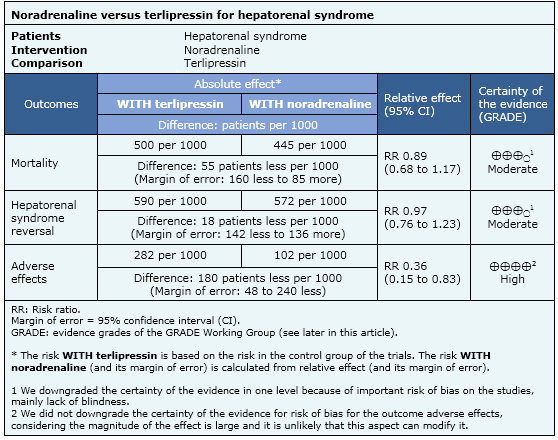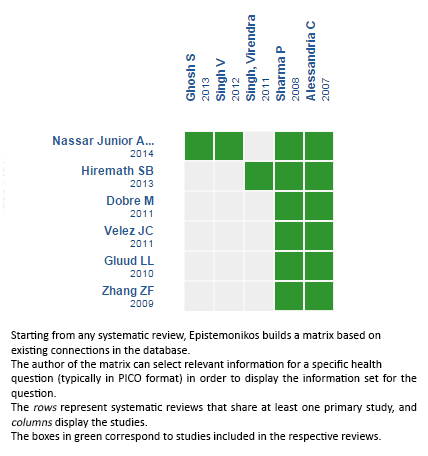 Para Descargar PDF debe Abrir sesión.
Para Descargar PDF debe Abrir sesión.
Hepatorenal syndrome is a condition associated with very high mortality that may be reverted in some cases with vasoconstrictors. Terlipressin has generally been considered standard treatment, but noradrenaline has been postulated as alternative. Searching in Epistemonikos database, which is maintained by screening 30 databases, we identified six systematic reviews including four pertinent randomized controlled trials. We combined the evidence using meta-analysis and generated a summary of findings following the GRADE approach. We concluded noradrenaline and terlipressin probably have similar effects on reverting hepatorrenal syndrome and decreasing mortality, but noradrenaline is associated with less adverse effects, and has lower costs.
Hepatorenal syndrome is a condition associated with very high mortality. It is caused by intense renal vasoconstriction consequence of systemic and portal hemodynamic disturbances, particularly splacnic system vasodilation. Intravascular volume expansion and prolonged treatment with vasoconstrictors can revert kidney failure in some patients. Terlipressin improves renal function and decreases mortality, however it has frequent adverse effects, high cost, and it is not widely available. The use of alternative vasoconstrictors has been proposed, such as noradrenaline, which is widely available and has a lower cost.
We used Epistemonikos database, which is maintained by screening more than 30 databases, to identify systematic reviews and their included primary studies. With this information, we generated a structured summary using a pre-established format, which includes key messages, a summary of the body of evidence (presented as an evidence matrix in Epistemonikos), meta-analysis of the total of studies, a summary of findings table following the GRADE approach and a table of other considerations for decision-making.
|
Key messages
|
|
What is the evidence. |
We found six systematic reviews [1],[2],[3],[4],[5],[6] including four randomized controlled trials, reported in five references [7],[8],[9],[10],[11]. |
|
What types of patients were included |
The studies included adults with advanced liver disease (Child Pugh C). One study [8] included patients with type 2 hepatorenal syndrome, one did not limit by hepatorenal type [7] and two studies included type 1 hepatorenal syndrome [9],[11]. MELD score ranged between 20 and 30 points in three studies [7],[9],[11] and more than 30 in one [8]. Average creatinine level ranged between 2 and 3 mg/dl in all of the studies. |
|
What types of interventions were included |
All studies compared terlipressin to noradrenaline. Noradrenaline dose ranged from 0.5 to 3 mg/hr. Terlipressin dose was 0.5 to 2 mg every 6 hours in three studies [8],[9],[11] and 1 to 2 mg every 4 hours in one [7]. |
|
What types of outcomes |
Mortality, renal function recovery and adverse events. |
The information on the effects of noradrenaline compared to terlipressin is based on four randomized trials including 154 patients. All studies reported the outcomes: mortality, hepatorenal syndrome reversal and adverse effects.


|
To whom this evidence does and does not apply |
|
| About the outcomes included in this summary |
| Balance between benefits and risks, and certainty of the evidence |
|
| What would patients and their doctors think about this intervention |
|
| Resource considerations |
|
|
Differences between this summary and other sources |
|
| Could this evidence change in the future? |
|
Using automated and collaborative means, we compiled all the relevant evidence for the question of interest and we present it as a matrix of evidence.
Matrix of evidence (static version).
Follow the link to access the interactive version: Terlipressin versus noradrenaline for hepatorenal syndrome
The upper portion of the matrix of evidence will display a warning of “new evidence” if new systematic reviews are published after the publication of this summary. Even though the project considers the periodical update of these summaries, users are invited to comment in Medwave or to contact the authors through email if they find new evidence and the summary should be updated earlier. After creating an account in Epistemonikos, users will be able to save the matrixes and to receive automated notifications any time new evidence potentially relevant for the question appears.
The details about the methods used to produce these summaries are described here http://dx.doi.org/10.5867/medwave.2014.06.5997.
Epistemonikos foundation is a non-for-profit organization aiming to bring information closer to health decision-makers with technology. Its main development is Epistemonikos database (www.epistemonikos.org).
These summaries follow a rigorous process of internal peer review.
Conflicts of interest
The authors do not have relevant interests to declare.

 Matrix of evidence (static version).
Matrix of evidence (static version).
 Esta obra de Medwave está bajo una licencia Creative Commons Atribución-NoComercial 3.0 Unported. Esta licencia permite el uso, distribución y reproducción del artículo en cualquier medio, siempre y cuando se otorgue el crédito correspondiente al autor del artículo y al medio en que se publica, en este caso, Medwave.
Esta obra de Medwave está bajo una licencia Creative Commons Atribución-NoComercial 3.0 Unported. Esta licencia permite el uso, distribución y reproducción del artículo en cualquier medio, siempre y cuando se otorgue el crédito correspondiente al autor del artículo y al medio en que se publica, en este caso, Medwave.

Hepatorenal syndrome is a condition associated with very high mortality that may be reverted in some cases with vasoconstrictors. Terlipressin has generally been considered standard treatment, but noradrenaline has been postulated as alternative. Searching in Epistemonikos database, which is maintained by screening 30 databases, we identified six systematic reviews including four pertinent randomized controlled trials. We combined the evidence using meta-analysis and generated a summary of findings following the GRADE approach. We concluded noradrenaline and terlipressin probably have similar effects on reverting hepatorrenal syndrome and decreasing mortality, but noradrenaline is associated with less adverse effects, and has lower costs.
 Autores:
Pilar Celis[1,5], Gabriel Rada[1,2,3,4,5]
Autores:
Pilar Celis[1,5], Gabriel Rada[1,2,3,4,5]

Citación: Celis P, Rada G. Noradrenaline or terlipressin for hepatorenal syndrome?. Medwave 2015 Ago;15(Suppl 2):e6235 doi: 10.5867/medwave.2015.6235
Fecha de publicación: 27/8/2015

Nos complace que usted tenga interés en comentar uno de nuestros artículos. Su comentario será publicado inmediatamente. No obstante, Medwave se reserva el derecho a eliminarlo posteriormente si la dirección editorial considera que su comentario es: ofensivo en algún sentido, irrelevante, trivial, contiene errores de lenguaje, contiene arengas políticas, obedece a fines comerciales, contiene datos de alguna persona en particular, o sugiere cambios en el manejo de pacientes que no hayan sido publicados previamente en alguna revista con revisión por pares.
Aún no hay comentarios en este artículo.
Para comentar debe iniciar sesión
 Medwave publica las vistas HTML y descargas PDF por artículo, junto con otras métricas de redes sociales.
Medwave publica las vistas HTML y descargas PDF por artículo, junto con otras métricas de redes sociales.
 Dobre M, Demirjian S, Sehgal AR, Navaneethan SD. Terlipressin in hepatorenal syndrome: a systematic review and meta-analysis. Int Urol Nephrol. 2011 Mar;43(1):175-84. | CrossRef | PubMed |
Dobre M, Demirjian S, Sehgal AR, Navaneethan SD. Terlipressin in hepatorenal syndrome: a systematic review and meta-analysis. Int Urol Nephrol. 2011 Mar;43(1):175-84. | CrossRef | PubMed | Gluud LL, Christensen K, Christensen E, Krag A. Systematic review of randomized trials on vasoconstrictor drugs for hepatorenal syndrome. Hepatology. 2010 Feb;51(2):576-84. | CrossRef | PubMed |
Gluud LL, Christensen K, Christensen E, Krag A. Systematic review of randomized trials on vasoconstrictor drugs for hepatorenal syndrome. Hepatology. 2010 Feb;51(2):576-84. | CrossRef | PubMed | Hiremath SB, Srinivas LD. Survival benefits of terlipressin and non-responder state in hepatorenal syndrome: a meta-analysis. Indian J Pharmacol. 2013 Jan-Feb;45(1):54-60.
| CrossRef | PubMed |
Hiremath SB, Srinivas LD. Survival benefits of terlipressin and non-responder state in hepatorenal syndrome: a meta-analysis. Indian J Pharmacol. 2013 Jan-Feb;45(1):54-60.
| CrossRef | PubMed | Nassar Junior AP, Farias AQ, D' Albuquerque LA, Carrilho FJ, Malbouisson LM. Terlipressin versus norepinephrine in the treatment of hepatorenal syndrome: a systematic review and meta-analysis. PLoS One. 2014 Sep 9;9(9):e107466. | CrossRef | PubMed |
Nassar Junior AP, Farias AQ, D' Albuquerque LA, Carrilho FJ, Malbouisson LM. Terlipressin versus norepinephrine in the treatment of hepatorenal syndrome: a systematic review and meta-analysis. PLoS One. 2014 Sep 9;9(9):e107466. | CrossRef | PubMed | Velez JC, Nietert PJ. Therapeutic response to vasoconstrictors in hepatorenal syndrome parallels increase in mean arterial pressure: a pooled analysis of clinical trials. Am J Kidney Dis. 2011 Dec;58(6):928-38. | CrossRef | PubMed |
Velez JC, Nietert PJ. Therapeutic response to vasoconstrictors in hepatorenal syndrome parallels increase in mean arterial pressure: a pooled analysis of clinical trials. Am J Kidney Dis. 2011 Dec;58(6):928-38. | CrossRef | PubMed | Zhang ZF, Yang N, Zhao G, Liu LN, Wang YD, Duan ZJ. [Meta-analysis of terlipressin in treatment of hepatorenal syndrome: an update]. Zhonghua Yi Xue Za Zhi. 2009 Jul 28;89(28):1970-4. | PubMed |
Zhang ZF, Yang N, Zhao G, Liu LN, Wang YD, Duan ZJ. [Meta-analysis of terlipressin in treatment of hepatorenal syndrome: an update]. Zhonghua Yi Xue Za Zhi. 2009 Jul 28;89(28):1970-4. | PubMed | Alessandria C, Ottobrelli A, Debernardi-Venon W, Todros L, Cerenzia MT, Martini S, et al. Noradrenalin vs terlipressin in patients with hepatorenal syndrome: a prospective, randomized, unblinded, pilot study. J Hepatol. 2007 Oct;47(4):499-505.
| PubMed |
Alessandria C, Ottobrelli A, Debernardi-Venon W, Todros L, Cerenzia MT, Martini S, et al. Noradrenalin vs terlipressin in patients with hepatorenal syndrome: a prospective, randomized, unblinded, pilot study. J Hepatol. 2007 Oct;47(4):499-505.
| PubMed | Ghosh S, Choudhary NS, Sharma AK, Singh B, Kumar P, Agarwal R, et al. Noradrenaline vs terlipressin in the treatment of type 2 hepatorenal syndrome: a randomized pilot study. Liver Int. 2013 Sep;33(8):1187-93. | CrossRef | PubMed |
Ghosh S, Choudhary NS, Sharma AK, Singh B, Kumar P, Agarwal R, et al. Noradrenaline vs terlipressin in the treatment of type 2 hepatorenal syndrome: a randomized pilot study. Liver Int. 2013 Sep;33(8):1187-93. | CrossRef | PubMed | Sharma P, Kumar A, Shrama BC, Sarin SK. An open label, pilot, randomized controlled trial of noradrenaline versus terlipressin in the treatment of type 1 hepatorenal syndrome and predictors of response. Am J Gastroenterol. 2008 Jul;103(7):1689-97. | CrossRef | PubMed |
Sharma P, Kumar A, Shrama BC, Sarin SK. An open label, pilot, randomized controlled trial of noradrenaline versus terlipressin in the treatment of type 1 hepatorenal syndrome and predictors of response. Am J Gastroenterol. 2008 Jul;103(7):1689-97. | CrossRef | PubMed | Singh V, Ghosh S, Chawla Y, Singh B, Sharma N, Bhalla A, et al. Noradrenaline versus terlipressin in the treatment of hepatorenal syndrome. Gastroenterology. 2011 May;140(5, Suppl 1):s-958. | Link |
Singh V, Ghosh S, Chawla Y, Singh B, Sharma N, Bhalla A, et al. Noradrenaline versus terlipressin in the treatment of hepatorenal syndrome. Gastroenterology. 2011 May;140(5, Suppl 1):s-958. | Link | Singh V, Ghosh S, Singh B, Kumar P, Sharma N, Bhalla A, et al. Noradrenaline vs. terlipressin in the treatment of hepatorenal syndrome: a randomized study. J Hepatol. 2012 Jun;56(6):1293-8. | CrossRef | PubMed |
Singh V, Ghosh S, Singh B, Kumar P, Sharma N, Bhalla A, et al. Noradrenaline vs. terlipressin in the treatment of hepatorenal syndrome: a randomized study. J Hepatol. 2012 Jun;56(6):1293-8. | CrossRef | PubMed |